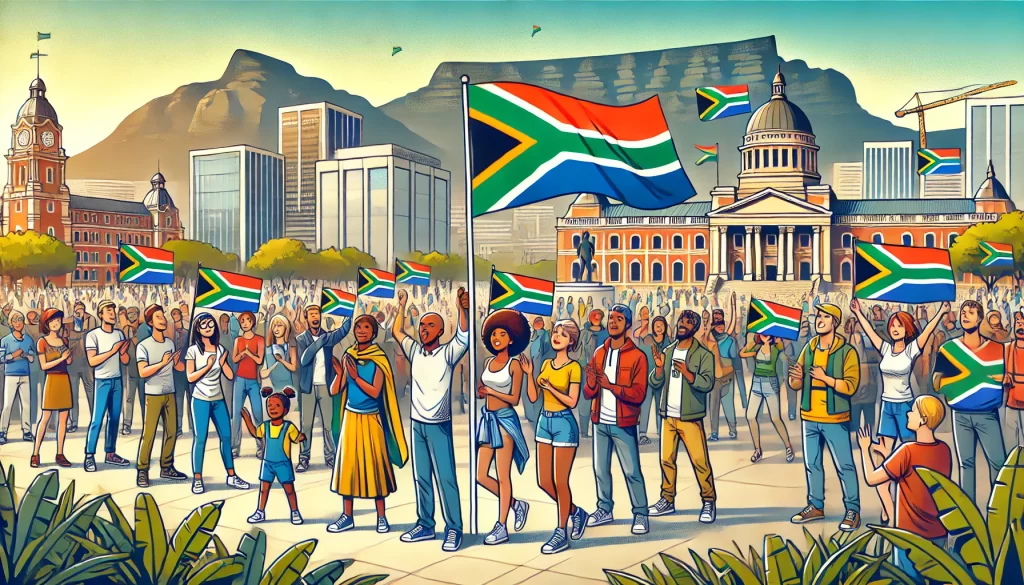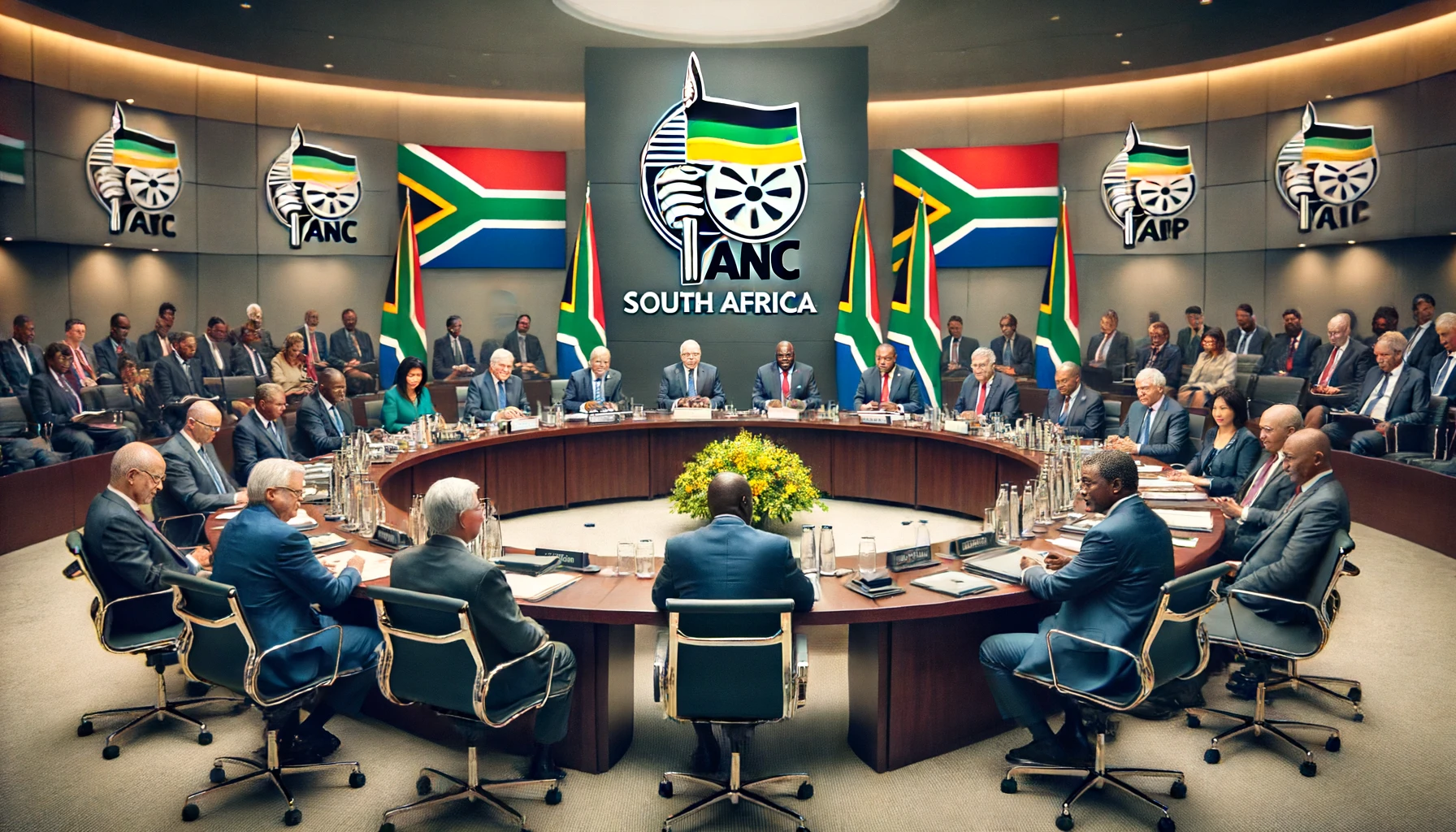In a groundbreaking political development, South Africa’s African National Congress (ANC) has formed a coalition government with its main opposition, the Democratic Alliance (DA), and the smaller Inkatha Freedom Party (IFP). This significant alliance marks a notable shift in the country’s political landscape, which has been dominated by the ANC since the end of apartheid nearly 30 years ago.
The announcement of this “government of national unity” was made on Friday, the eve of the first sitting of South Africa’s new Parliament in Cape Town, following the ANC’s loss of its long-held parliamentary majority in the May elections. The ANC received only 40% of the national vote, a clear indication of public dissatisfaction with a struggling economy, high unemployment, poor service delivery, and widespread corruption.
President Cyril Ramaphosa, leader of the ANC, was re-elected for a second term during this first parliamentary session, defeating Julius Malema of the far-left Economic Freedom Fighters (EFF). Ramaphosa’s re-election was secured through the support of the DA and IFP, signaling a move towards greater political collaboration.
The DA, led by John Steenhuisen, garnered almost 22% of the vote. Despite being led by a white politician in a country where less than 10% of the population is white, the DA has established itself as a pro-business party known for advocating clean governance. Steenhuisen, addressing the press, called the coalition “a new chapter in our history” and emphasized the need for a “new politics of collaboration and problem solving.”
The IFP, a conservative party with strong roots in the Zulu community, also joined the coalition, with IFP negotiator iNkosi Mzamo Buthelezi highlighting South Africa’s identity as the Rainbow Nation. The inclusion of the IFP adds a regional dimension to the coalition, reinforcing the need for broad-based support in addressing national issues.
The coalition negotiations were complex and involved significant backroom discussions. ANC Secretary-General Fikile Mbalula stated, “We have reached a major breakthrough that the majority of political parties in our country have agreed to work together.” However, he also noted that some details of the agreement were still being finalized.

One of the critical points of contention was the potential inclusion of the EFF in the unity government. The EFF, led by Malema, advocates for radical policies, including the nationalization of mines and banks. Both the ANC and DA had reservations about including the EFF, with Malema rejecting the coalition and labeling the DA as “racist.” The EFF’s refusal to join the government underscores the ideological divides within South African politics.
The newly formed populist party uMkhonto weSizwe (MK), led by former President Jacob Zuma, boycotted the parliamentary proceedings, alleging election rigging without providing proof. Zuma, who was forced to resign as president in 2018 amid multiple corruption scandals, has remained a polarizing figure. Despite his criminal conviction for contempt of court and an upcoming trial for alleged corruption, Zuma retains significant support in his home province of KwaZulu-Natal.
The formation of this unity government has been positively received by South African markets, with investors viewing the DA’s involvement as a stabilizing force. The ANC’s acceptance of its electoral losses and willingness to form a coalition reflects a mature approach to governance, with comparisons drawn to the aftermath of the U.S. Capitol attack on January 6, 2021.
The parliamentary session was marked by much pomp and ceremony, with legislators dressed in traditional outfits and a choir singing. The session took place at the Cape Town International Convention Center, as the historic parliament building is still under renovation following a fire in 2022.
This is not the first time South Africa has seen a government of national unity. The first democratic government in 1994 was a power-sharing agreement between Nelson Mandela and F.W. de Klerk, symbolizing reconciliation. The current coalition aims to address pressing issues such as economic recovery, governance reforms, and social unity.
This article is based on the following articles:
https://www.npr.org/2024/06/14/nx-s1-5003237/south-africa-anc-da-national-unity-government-coalition

Background Information
1. Apartheid and Its End
- Apartheid: Apartheid was a policy of racial segregation and discrimination enforced by the South African government from 1948 to 1994. It categorized people into racial groups (white, black, colored, and Indian) and provided privileges to the white population while oppressing other races.
- End of Apartheid: The apartheid system began to dismantle in the late 1980s and officially ended in 1994, leading to the first democratic elections in which all races could vote. Nelson Mandela, a key anti-apartheid activist who was imprisoned for 27 years, became the country’s first black president.
2. African National Congress (ANC)
- Founding: The ANC was founded in 1912 to fight against racial discrimination and played a leading role in the struggle against apartheid.
- Post-Apartheid Dominance: Since the end of apartheid, the ANC has been the dominant political party in South Africa. It has won every national election from 1994 until it lost its outright majority in the 2024 elections.
- Leadership: Notable leaders include Nelson Mandela, Thabo Mbeki, Jacob Zuma, and the current president, Cyril Ramaphosa.
3. Economic Freedom Fighters (EFF)
- Formation: The EFF was founded in 2013 by Julius Malema, a former ANC Youth League president.
- Policies: The EFF advocates for radical economic reforms, including the nationalization of mines and banks and the expropriation of land without compensation. It is known for its militant and confrontational style.
- Impact: The EFF has quickly gained support, particularly among younger voters and those frustrated with the pace of economic transformation under the ANC.
4. Democratic Alliance (DA)
- History: The DA traces its origins back to the Progressive Party, formed in 1959. It emerged as the primary opposition to the ANC after apartheid.
- Leadership: The DA is currently led by John Steenhuisen. Historically, it has been led by white politicians, which has influenced its public perception.
- Policies: The DA promotes liberal democracy, economic growth through free-market policies, and clean governance. It is seen as pro-business and has a strong base among urban, middle-class voters.
5. Inkatha Freedom Party (IFP)
- Formation: The IFP was founded in 1975 by Mangosuthu Buthelezi and has a strong base among the Zulu ethnic group.
- Role: During the apartheid era, the IFP was involved in violent clashes with the ANC. In the democratic era, it has played a role in regional politics, particularly in KwaZulu-Natal.
6. Jacob Zuma and uMkhonto weSizwe (MK) Party
- Jacob Zuma: Zuma served as South Africa’s president from 2009 to 2018. His presidency was marred by allegations of corruption and economic mismanagement, leading to his resignation.
- MK Party: Named after the armed wing of the ANC during the anti-apartheid struggle, the uMkhonto weSizwe party was formed by Zuma and his supporters. It aims to challenge the ANC, leveraging Zuma’s popularity in certain regions.
7. South Africa’s Political Landscape Post-1994
- Transition to Democracy: The transition from apartheid to democracy was marked by efforts to reconcile and build a “Rainbow Nation,” a term popularized by Archbishop Desmond Tutu to describe South Africa’s multicultural society.
- Government of National Unity: The first democratic government in 1994 included a power-sharing agreement between Nelson Mandela (ANC) and F.W. de Klerk (the last apartheid-era president). This government was a symbol of reconciliation and cooperation.
- Current Challenges: South Africa faces several challenges, including economic inequality, high unemployment, and corruption. The unity government aims to address these issues through collaborative governance.
8. Cyril Ramaphosa’s Presidency
- Background: Ramaphosa, a former trade union leader and businessman, succeeded Zuma as ANC leader and became president in 2018. He has focused on economic reforms and anti-corruption measures.
- Current Term: Ramaphosa’s re-election in 2024 required forming a coalition government due to the ANC losing its parliamentary majority.
9. Economic and Social Context
- Economic Issues: South Africa has one of the highest unemployment rates in the world, significant economic inequality, and slow economic growth. These issues have led to public frustration and declining support for the ANC.
- Social Services: Challenges in service delivery, such as water, electricity, and healthcare, have further eroded public trust in the government.
Please subscribe to Insight Fortnight, our biweekly newsletter!
